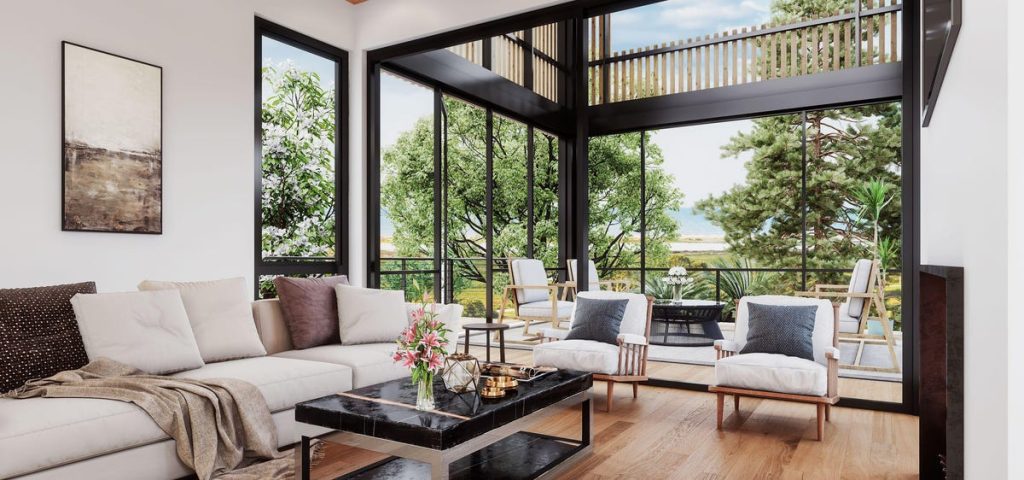Ensuring abundant green space can be placed within new residential communities is a comparatively fresh approach to land planning.
But at select residential environments across the Carolinas, designing with nature by protecting large natural habitats has long been a tradition. It might be said these communities exist within, rather than simply on top of, the land.
Kiawah Island
An example can be found in South Carolina, at the Kiawah Island community set on a distinctive barrier island. Since its establishment in 1974, designers have striven to safeguard a delicate balance between the natural world and the built environment.
More recently, the establishment on Kiawah of Front Nine Lane, proximate to the first hole of the island’s Ocean Course, has permitted trios of new homes to be arrayed along a shared green space.
This positioning permits optimal “viewing corridors” of the water from each home, while also inviting sea breezes to waft across each porch and terrace.
“Designing with nature is more than a tag line for Kiawah,” says Amanda L. Mole, AIA and director of architecture.
“The siting of a home is the primary consideration, taking the lead over style. How home relates to topography, tree canopy, sun patterns and breezes guides the home designing process. While Front Nine Lane is a recent addition to Kiawah, this collection of homes exemplifies the goal of fitting architecture into the landscape, the hallmark of the island’s development since its inception.”
Palmetto Bluff
Among the East Coast’s largest remaining contiguous entitled waterfront properties, the lively residential and recreational community of Palmetto Bluff rigorously retains the natural splendor, size and richness of its South Carolina sea island milieu.
New is Moreland Forest, Palmetto Bluff’s most recent real estate undertaking. Developed by South Street Partners, Moreland Forest is built along wildlife corridors overlooking preserved areas. Emphasizing such elements as lower sloped roofs, generous glass expanses and multiple porches, Moreland Forest home design allows for a seamless flow outdoors to indoors, spurring resident engagement with nature.
Designing with nature at Palmetto Bluff involves fervent respect for existing ecosystems and the built environment of nature, says Stephanie Gentemann, Palmetto Bluff’s director of design. “Moreland Forest is blessed with a diverse range of habitats including oak and hickory, hardwood pine and mixed pine upland, pine flatwoods and evergreen wetlands,” she adds.
“Homesites and building setbacks are laid out to preserve specific trees, and maximum size and coverage requirements help keep the scale of projects in check. Porches and outdoor pavilions are key architectural components that connect people to their natural surroundings, allowing the owner to feel the cooling breezes, hear birds singing and smell the aroma of tea olives in full bloom.”
The Cliffs
A grouping of private, luxury residential communities set between Asheville, N.C. and Greenville, S.C. in a region of mountains and lakes, The Cliffs has gone so far as to introduce homes that emerge out of the sides of mountains.
The Cliffs newest community, Waterscape, is located on the water at The Landing at Keowee Springs. It features the designs of architectural firm Lake|Flato, known for crafting structures that meld artfulness with environmental responsibility. The homes at Waterscape are configured in such a way as to maximize viewing corridors.
“Real communities have a diversity of elements,” says Mark Permar, the project’s planning and design advisor, whose firm has also served as Kiawah Island master planner for more than 35 years.
“Waterscape has a light touch and by the use of natural materials, soft colors and with the introduction of a great deal of natural light, it blurs the lines of indoor and outdoor. All organized by natural breezes and solar patterns, it is connecting to the natural systems, but in a very progressive way.”
Read the full article here



